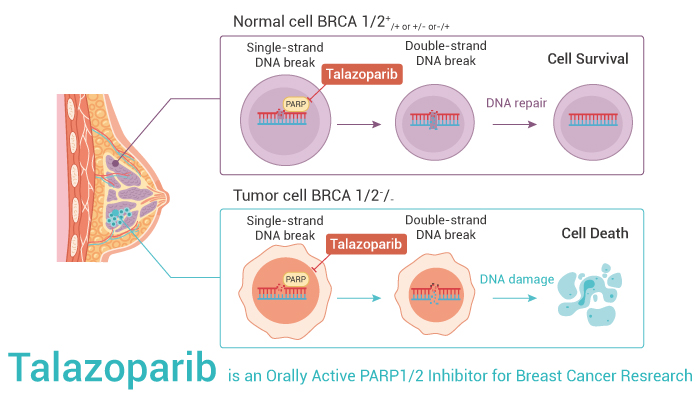As we know, cancers continues to be a leading cause of mortality worldwide. The search for effective treatments remains an active area of research. One key player in the arena is the family of proteins called poly (ADP-ribose) polymerases (PARPs). Meanwhile, cancer cells often display deficiencies in DNA repair pathways and are more susceptible to pharmaceutical intervention of the remaining DNA repair pathways than normal cells. Particularly, PARP1/PARP2 plays a role in repairing damaged DNA and programmed cell death. Thus, the ability to inhibit PARP1 and PARP2 has become a promising strategy for develop anti-cancer agent, especially BRCA mutated breast cancer. Noticeably, Talazoparib (BMN-673), a highly potent and orally active PARP1/2 inhibitor, has been approved for breast cancer and prostate cancer treatment by FDA in 2023.

Talazoparib, a PARP1/2 Inhibitor, is an anticancer agent for breast cancer research.
In vitro, Talazoparib has demonstrated its potent inhibitory effects on cancer cell growth. Specifically, Talazoparib selectively inhibits PARP1 and PARP2 (IC50: 0.57 nM for PARP1, Kis: 1.2 nM and 0.87 nM respectively). Remarkably, Talazoparib has displayed superior potency than Veliparib, Rucaparib and Olaparib. In addition, Talazoparib shows potent cytotoxicity against tumor cells with BRCA1, BRCA2 or PTEN mutations (IC50: less than 10 nM). IC50: 0.3, 5, 6, 3, 4 nM for MX-1, MB-468, LNCap, PC-3 cells respectively.
In vivo, mice implanted with BRCA-deficient tumors responded positively to Talazoparib. The compound not only slows tumor growth but also improves survival rates. Talazoparib (0.33 mg/kg; i.g.; once daily; for 28 days) exhibits antitumor activity against BRCA1 mutant breast cancer model in mice. Besides, Talazoparib (mg/kg, p.o., rats) exhibits moderate F% (56%) and Cmax (7948 ng/mL). Talazoparib (5 mg/kg, i.v., rat) exhibits the terminal elimination half-life (2.25 h) and plasma clearance rate (2 mL/min/kg).
To sum up, Talazoparib is an orally active PARP1/2 inhibitor. Talazoparib shows anticancer activity in BRCA-deficient tumor mice.
References:
[1] Wang B, et al. J Med Chem. 2016 Jan 14;59(1):335-57.
[2]. Shen Y, et al. Clin Cancer Res. 2013 Sep 15;19(18):5003-15.